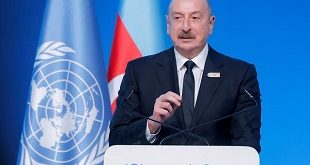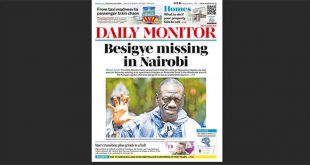
Mongoumba, Central African Republic | AFP | Under the tarpaulin shading the back of the lorry, the heat is still stifling on a rough road for some 30 refugees travelling home to the strife-weary Central African Republic.
Potholes rattle spines and send up fine grit that sticks to the sweaty bodies of exhausted adults and small children and animals, almost hidden in a tangle of limbs.
Yet the men and women look relieved.
They are glad to be homeward bound after tough years spent in the Republic of Congo, following agreements signed with neighbouring countries by the government and the UN High Commissioner for Refugees in July and August.
Albert Bekpa, a fisherman from the capital Bangui, made the most of the journey despite the discomfort.
“This is a feast day!” he proclaimed, brandishing an elegantly carved walking stick, a treasure he has kept close since exile in 2014.
His cries found echoes from outside.
All along the track from the Congolese border to a UNHCR transit camp at Mongoumba, villagers turned out to hail their returning compatriots. Children waved palm branches and the elders stood up from their seats.
The United Nations estimates that more than a quarter of the 4.7 million inhabitants in the deeply poor and landlocked CAR fled abroad in the turmoil after an armed movement drawn from the Muslim minority ousted President Francois Bozize in 2013.
Since then, the CAR has been ravaged by conflicts pitting a range of armed movements against the security forces and each other in a ragged civil war fuelled by ethnic factors, religious faith and a struggle to control resources.
– ‘A legal framework’ –
The UNHCR estimates that more than 600,000 of the uprooted civilians still live abroad, mainly in Cameroon, the Republic of Congo and the Democratic Republic of Congo.
Many refugees have returned on their own, particularly since the Bangui government, which is supported by a UN peacekeeping mission, signed peace pacts in February with 14 of the armed groups staking territorial claims.
For the past seven months, several provinces have seen relative calm.
“Those who returned in spontaneous fashion had no support,” said Stella Fatime, communications official with the UNHCR.
“We needed to set a legal framework to guarantee that volunteers could return in dignity and safety.”
According to available figures, 4,983 refugees in the Republic of Congo have asked to be taken home since August 1 under one of the signed agreements.
Valerie, a Christian trader from the mainly Muslim PK5 district of Bangui, wants to forget the clashes between communities that forced her to flee in 2013.
“In the camps, we lived together very well,” she said as the lorry arrived at Mongoumba. “We’ll do the same at home.”
Communal ties may have been fine in the Congo camps, but everybody agreed that life was grim.
Food rations and medical supplies were inadequate, schooling was difficult and the chances of employment were hopeless.
– ‘Life of a slave’ –
“Some people managed to get jobs as hired daily labourers in the fields. Me, I had to wait for nightfall to go out to fish in hiding, find something to eat. It was the life of a slave!” Albert said.
“Depending on the WFP (World Food Programme) and the UNHCR is no kind of life,” said Youssouf, another trader from PK5.
Among the 365 “voluntary” repatriated people of the day, many expressed similar sentiments to Albert and Youssouf, saying that they felt compelled to return to be able to feed their families.
The UNHCR gives each adult 150,000 CFA francs (229 euros / $252) to help them make a fresh start. Abdelaziz had no illusions that he would have to use the money for temporary housing in Bangui.
“Our house was destroyed in 2013. But we’ll manage,” he said, planning to rent as long as it takes him to hustle up the means to live — or survive — in one of the world’s poorest countries.
Those with property still standing also faced the unknown and were warned as soon as they reached the transit camp.
“If your house is occupied by somebody, do not chase them out. You must speak to the district chief,” an organiser warned by megaphone.
With another four hours of rough riding ahead to reach the capital, Albert and his family listened to the announcement with concern. “I had plots of land in Bangui and I just don’t know what has happened to them.”
 The Independent Uganda: You get the Truth we Pay the Price
The Independent Uganda: You get the Truth we Pay the Price


